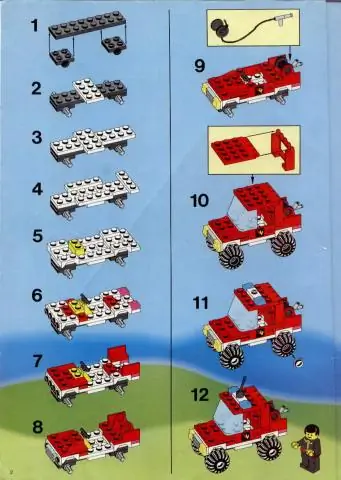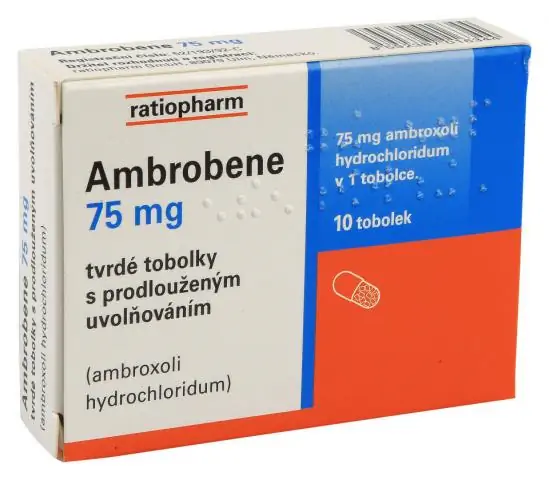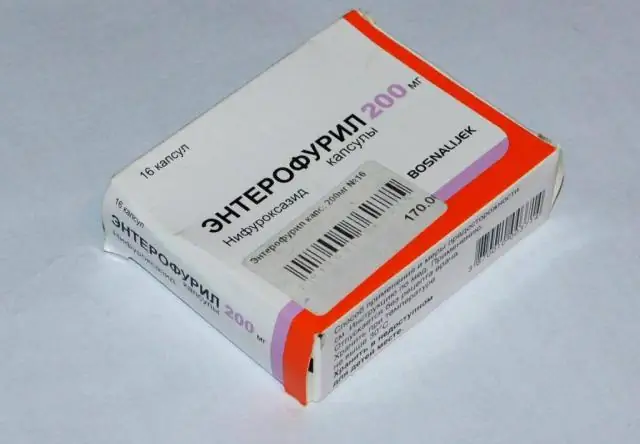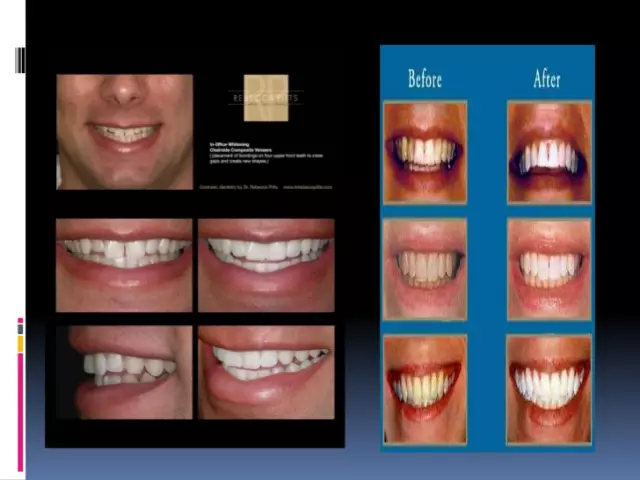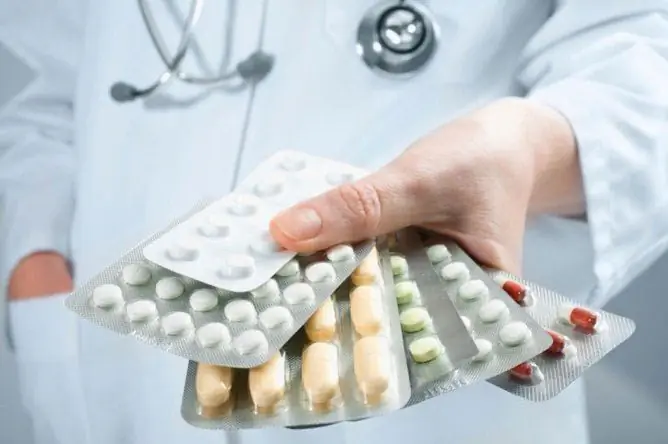- Author Rachel Wainwright wainwright@abchealthonline.com.
- Public 2023-12-15 07:39.
- Last modified 2025-11-02 20:14.
Neuleptil
Neuleptil: instructions for use and reviews
- 1. Release form and composition
- 2. Pharmacological properties
- 3. Indications for use
- 4. Contraindications
- 5. Method of application and dosage
- 6. Side effects
- 7. Overdose
- 8. Special instructions
- 9. Drug interactions
- 10. Analogs
- 11. Terms and conditions of storage
- 12. Terms of dispensing from pharmacies
- 13. Reviews
- 14. Price in pharmacies
Latin name: Neuleptil
ATX code: N05AC01
Active ingredient: peritsiazine (periciazine)
Manufacturer: Sanofi-Aventis France, France
Description and photo update: 2019-13-08
Prices in pharmacies: from 122 rubles.
Buy
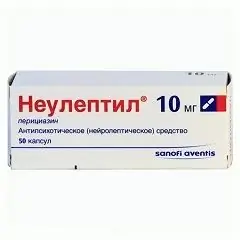
Neuleptil is an antipsychotic drug.
Release form and composition
Dosage forms of Neuleptila release:
- Capsules: size No. 4, gelatinous solid, opaque, white, the capsules contain a yellow powder, practically odorless (10 pcs. In blisters, 5 blisters in a cardboard box);
- Oral solution: transparent, yellow-brown, fluorescent, has a mint smell (30 or 125 ml in dark neutral glass bottles (type III), 1 bottle in a cardboard box, complete with a dropper (30 ml each) or a plastic syringe - dispenser (125 ml each)).
1 capsule contains:
- Active substance: peritsiazine - 10 mg;
- Auxiliary components: calcium hydrogen phosphate dihydrate - 137 mg, magnesium stearate - 3 mg;
- Capsule shell: titanium dioxide (E171) - 3%, gelatin - up to 100% (total capsule weight - 150 mg).
The composition of 1 ml of solution includes:
- Active substance: peritsiazine - 40 mg;
- Auxiliary components: sucrose - 250 mg, ascorbic acid - 8 mg, tartaric acid - 16.5 mg, glycerin (glycerol) - 150 mg, peppermint leaf oil - 0.4 mg, ethanol 96% - 97.4 mg, caramel (E150d) - 2 mg, purified water - up to 1 ml.
Pharmacological properties
Neuleptil is characterized by antispasmodic, sedative, hypnotic, antipsychotic and antiemetic effects on the body.
Pharmacodynamics
Peritsiazine is an antipsychotic that belongs to the group of piperidine derivatives of phenothiazine, which has antidopaminergic activity. This explains the development of a therapeutic antipsychotic (no stimulating component) effect, as well as a hypothermic and antiemetic effect of the drug. However, antidopaminergic activity is also due to the occurrence of side effects from taking peritsiazine (hyperprolactinemia, movement disorders and extrapyramidal syndrome).
The antidopaminergic activity of the active substance Neuleptil is characterized by a moderate degree of severity, as a result of which it has a moderate antipsychotic effect in moderately severe extrapyramidal disorders. Peritsiazine blocks the adrenergic receptors of the reticular formation, located in the brain stem, and central histamine receptors, which causes a noticeable sedative effect, which is ranked among the desired clinical effects, especially in angry and maliciously irritable types of affect. At the same time, a decrease in aggressiveness is not accompanied by the development of lethargy and lethargy. Unlike chlorpromazine, peritsiazine is characterized by a more pronounced antiemetic, antiserotonin and central sedative effect, but less pronounced antihistamine effect.
Peritsiazine reduces disinhibition, aggressiveness, excitability, which proves its effectiveness in behavioral disorders. For this reason, he is known among experts as a "behavior corrector".
The antiallergic properties of the drug are explained by the blockade of peripheral H 1 -histamine receptors. The consequence of the blockade of peripheral adrenergic structures is its hypotensive effect. Neuleptil also exhibits anticholinergic activity.
Pharmacokinetics
After oral administration, pericyazine is well absorbed, but, like other phenothiazine derivatives, it participates in the processes of intensive first-pass metabolism in the liver and / or intestines. This leads to the fact that the content of unchanged periciazine in the blood plasma is less than with intramuscular administration, and varies in a wide range.
After oral administration of 20 mg of Neuleptil (2 capsules), the maximum concentration of its active component in plasma is reached within 2 hours and is equal to 150 ng / ml (410 nmol / l).
Peritsiazine binds to plasma proteins by about 90%. At the same time, it intensively penetrates the tissues and passes through the histohematological (including the blood-brain) barriers. Most of the substance is metabolized in the liver through conjugation and hydroxylation. Bile metabolites can be reabsorbed in the intestines. The half-life of periciazine varies from 12 to 30 hours, and the elimination of metabolites is an even longer process. Conjugated metabolites are excreted in the urine, and the rest of the pericyazine and its metabolites are excreted in feces and bile.
In elderly patients, the elimination of periciazine and its metabolites slows down somewhat.
Indications for use
Capsules
- Behavior disorders with aggressiveness (symptomatic therapy);
- Chronic psychoses, including schizophrenia (especially its deficit form) and chronic delirium, proceeding with a violent state and interpretive mechanisms (staged or auxiliary therapy).
Oral solution
Indications for use are manifestations of aggressiveness against the background of mental disorders.
Contraindications
Absolute:
- Closed-angle glaucoma;
- Parkinson's disease;
- Retention of urine against the background of diseases of the prostate gland;
- Porphyria, history of agranulocytosis;
- Concomitant use with levodopa;
- Hypersensitivity to drug components.
Relative (caution is required when prescribing Neuleptil against the background of the following diseases / conditions):
- Diseases of the cardiovascular system;
- Renal / hepatic impairment;
- Advanced age (due to the likelihood of developing excessive hypotensive and sedative effects).
It is advisable to limit the duration of drug therapy in pregnant women. At the end of pregnancy, if possible, it is recommended to reduce the dose of Neuleptil simultaneously with their correcting antiparkinsonian drugs that can potentiate the atropine-like effect of neuroleptics. After childbirth, the child needs to monitor the state of the digestive and nervous systems.
Due to the lack of the necessary data, the use of Neuleptil is not recommended for lactating women.
Instructions for use Neuleptila: method and dosage
Neuleptil capsules and solution are taken orally.
The dosage regimen is determined by the indications and the patient's age.
The daily dose should be taken in 2-3 doses, with an emphasis on the evening hours.
The average daily adult dose is usually in the range of 30-100 mg, if necessary, it can be increased to 200 mg.
For children from 3 years old, Neuleptil is prescribed in a daily dose of 0.1-0.5 mg / kg.
Side effects
As a rule, Neuleptil is well tolerated by patients, however, in some cases, disorders may develop, the severity of which is determined by the pharmacological properties of the neuroleptic.
At low initial doses, the following side effects may occur:
- Autonomic nervous system: orthostatic hypotension, anticholinergic effects in the form of constipation, dry mouth, urinary retention, paresis of accommodation;
- Nervous system: drowsiness or sedation (usually more pronounced at the beginning of the course of therapy), apathy, mood changes, states of depression and anxiety.
According to the instructions, Neuleptil in higher doses can lead to the development of disorders such as:
- Nervous system: early dyskinesias (in the form of spastic torticollis, oculomotor crises, trismus, etc.), extrapyramidal disorders (in the form of akinesia, sometimes in combination with muscle hypertonicity (partially eliminated by prescribing anticholinergic antiparkinsonian drugs), motor excitement, akathisia, hyperkinesia-hypertonicity); with long-term treatment - tardive dyskinesia;
- Endocrine system and metabolism: impotence, frigidity, hyperprolactinemia (in the form of amenorrhea, galactorrhea, gynecomastia), weight gain, hyperglycemia, decreased glucose tolerance, thermoregulation disorders.
Violations that occur in more rare cases and do not depend on the dose taken:
- Skin reactions: photosensitivity, allergic skin reactions;
- Organ of vision: decreased tone of the eyeballs, brownish deposits in the anterior chamber of the eye associated with the accumulation of Neuleptil (as a rule, they do not have an effect on vision);
- Hematopoietic system: rarely - agranulocytosis (it is recommended to conduct regular monitoring of a general blood test), leukopenia.
There is also a possibility of the following side effects:
- Cholestatic jaundice;
- A positive serological test for the presence of antinuclear antibodies, not accompanied by clinical manifestations of lupus erythematosis;
- Malignant neuroleptic syndrome, manifested by unexplained fever, pallor of the skin, hyperthermia and dysfunction of the autonomic nervous system (if these symptoms appear, therapy should be interrupted).
There were isolated cases of sudden death (probably, there were causes of a cardiac nature), as well as unexplained cases of sudden death.
Overdose
Symptoms of an overdose of Neuleptil include depression of the central nervous system, which can progress from mild drowsiness to a coma, accompanied by areflexia. In patients with initial manifestations of intoxication or intoxication of moderate severity, delirious or agitated states, anxiety, agitation, and clouding of consciousness are often noted. Other symptoms of overdose include cyanosis, apnea, depression of the respiratory center, a sharp drop in blood pressure, ECG changes, ventricular arrhythmias, tachycardia, difficulty swallowing, collapse, muscle hypotonia, muscle twitching, dystonic movements, convulsions, stiffness or muscle spasms, muscle contractions pupils, hypothermia. It is also likely to develop polyuria, causing dehydration, and extrapyramidal dyskinesias of severe degree.
Treatment of an overdose of Neuleptil is carried out exclusively in a specialized department of the hospital, where it is possible to organize constant monitoring of the functions of the cardiovascular and respiratory systems until the signs of a threat to health completely disappear. Symptomatic therapy is usually prescribed.
If Neuleptil was taken less than 6 hours ago, it is recommended to perform gastric lavage or aspiration of its contents. The use of antiemetics is considered unacceptable due to the increased risk of aspiration of vomit in the presence of extrapyramidal disorders and / or lethargy. It is possible to take activated carbon. There is no specific antidote.
Therapy should be aimed at maintaining the vital functions of the body. With a sharp drop in blood pressure, the patient should be transferred to a horizontal position and given his lower limbs an elevated position. Good results are obtained by intravenous infusion of fluid. If the introduction of fluid is insufficient to eliminate the manifestations of hypotension, the introduction of phenylephrine, dopamine or norepinephrine is allowed. The administration of epinephrine is contraindicated.
With hypothermia, one can expect an independent disappearance of its signs, except for cases when the body temperature drops to a level at which the development of cardiac arrhythmias becomes probable (approximately 29.4 ° C).
With the restoration of normal body temperature and the elimination of metabolic and hemodynamic dysfunctions, supraventricular or ventricular tachyarrhythmias usually disappear. If life-threatening rhythm disturbances persist, antiarrhythmic drugs should be administered. It is recommended to avoid lidocaine and other long-acting antiarrhythmics.
When the respiratory center and the central nervous system are inhibited, the patient is sometimes transferred to artificial ventilation and antibiotic therapy is prescribed to prevent infectious lung diseases.
Severe dystonic reactions are often managed by intravenous or intramuscular administration of orphenadrine (20-40 mg) or procyclidine (5-10 mg). The relief of seizures is possible with the intravenous administration of diazepam.
In extrapyramidal disorders, intramuscular administration of anticholinergic antiparkinsonian drugs is recommended.
special instructions
In pediatrics, it is recommended to use Neuleptil solution.
With the development of fever or the addition of an infection, it is necessary to conduct a general blood test (to exclude agranulocytosis).
Alcohol intake during therapy is not recommended.
Patients with epilepsy, due to the ability of Neuleptil to reduce the threshold of excitability of the cerebral cortex, require clinical and, if possible, electroencephalographic observation.
It should be borne in mind that therapy can lead to a prolongation of the QT interval and, accordingly, an increase in the likelihood of serious ventricular arrhythmias of the torsade de point type (pose a potential danger, since they can lead to sudden death).
Prolongation of the QT interval is especially enhanced by hypokalemia, bradycardia, and medication-acquired or congenital prolongation of the QT interval. Before starting a course of treatment, careful laboratory and medical research is required to exclude the likelihood of these risk factors.
Patients, especially those whose profession is related to driving, should take into account the likelihood of drowsiness, especially at the beginning of the therapeutic course.
Drug interactions
The presence of mutual antagonism was established between Neuleptil and levodopa. The combination of these drugs is contraindicated.
It is inappropriate to prescribe Neuleptil simultaneously with the following drugs:
- Alcohol and preparations containing it: enhancing the sedative effect of Neuleptil, mainly in the form of a decrease in the reaction, which poses a particular danger for patients whose work is related to driving;
- Sultopride: an increase in the likelihood of developing ventricular rhythm disturbances, in particular, ventricular fibrillation;
- Guanethidine and similar drugs: lowering its antihypertensive activity (it is recommended to use other antihypertensive drugs).
Due to a decrease in the absorption of Neuleptil in the gastrointestinal tract, caution is required when using it with antacids (salts, hydroxides and oxides of magnesium, calcium and aluminum). For combined use, it is recommended to observe an interval of at least 2 hours.
When combined with the following drugs, the likelihood of developing the following effects should be taken into account:
- Antihypertensive drugs (all): an increase in their action and the likelihood of developing orthostatic hypotension (due to cumulative action);
- Other drugs that inhibit the functioning of the nervous system are morphine derivatives, most blockers of histamine H 1 receptors with a sedative effect, benzodiazepines, barbiturates, anxiolytics that are not derivatives of benzodiazepines, clonidine and drugs containing it: increasing the inhibitory effect on the central nervous system (has essential, in particular when driving vehicles);
- Antidepressants, atropine and other anticholinergics, imipramine derivatives, antiparkinsonian drugs with anticholinergic action, disopyramide: cumulation of unwanted effects associated with anticholinergic action (in the form of urinary retention, constipation, dry mouth, etc.);
- Anxiolytics, analgesics, anesthetic drugs, hypnotics, ethanol: enhance their effects;
- Hepato- and nephrotoxic drugs: increased side effects;
- Tricyclic antidepressants, maprotiline, monoamine oxidase inhibitors: intensification and prolongation of anticholinergic and sedative effects;
- Thiazide diuretics: increased hyponatremia;
- Preparations containing lithium: a decrease in absorption in the gastrointestinal tract, an increase in the rate of excretion of lithium, an increase in the severity of extrapyramidal disorders;
- Beta-blockers: increased antihypertensive effect, possible risk of arrhythmias, irreversible retinopathy and tardive dyskinesia;
- Alpha and beta adrenostimulants (epinephrine) and sympathomimetics (ephedrine): paradoxical decrease in blood pressure;
- Amantadine, amitriptyline, antihistamines and other agents with anticholinergic effect: increased anticholinergic activity;
- Antithyroid drugs: increased risk of agranulocytosis;
- Appetite suppressants (except fenfluramine): decrease in their effectiveness;
- Apomorphine: an increase in its inhibitory effect on the central nervous system and a decrease in its emetic action;
- Prolactin: an increase in its concentration in plasma;
- Bromocriptine: a decrease in its action.
Analogs
The analogue of Neuleptil is Peritsiazine.
Terms and conditions of storage
Store in a dark place, out of reach of children, at temperatures up to 25 ° C.
Shelf life:
- Capsules - 5 years;
- Oral solution - 4 years.
Terms of dispensing from pharmacies
Dispensed by prescription.
Reviews about Neuleptile
According to reviews, Neuleptil is considered a fairly effective drug, despite the large list of side effects. When used according to indications, the drug is well tolerated by children, therefore, parents respond positively about it.
Price for Neuleptil in pharmacies
The approximate price of Neuleptil capsules in pharmacy chains is 235-280 rubles (the package includes 50 pcs.). You can buy an oral solution for about 275-306 rubles (for a 30 ml bottle) or for 1231-1379 rubles (for a 125 ml bottle).
Neuleptil: prices in online pharmacies
|
Drug name Price Pharmacy |
|
Neuleptil 10 mg capsule 50 pcs. 122 RUB Buy |
|
Neuleptil 4% oral solution 30 ml 1 pc. 172 r Buy |
|
Neuleptil capsules 10mg 50 pcs. 304 RUB Buy |
|
Neuleptil 4% oral solution 125 ml 1 pc. 1134 RUB Buy |
|
Neuleptil solution for internal approx. 125ml 1357 RUB Buy |

Anna Kozlova Medical journalist About the author
Education: Rostov State Medical University, specialty "General Medicine".
Information about the drug is generalized, provided for informational purposes only and does not replace the official instructions. Self-medication is hazardous to health!

